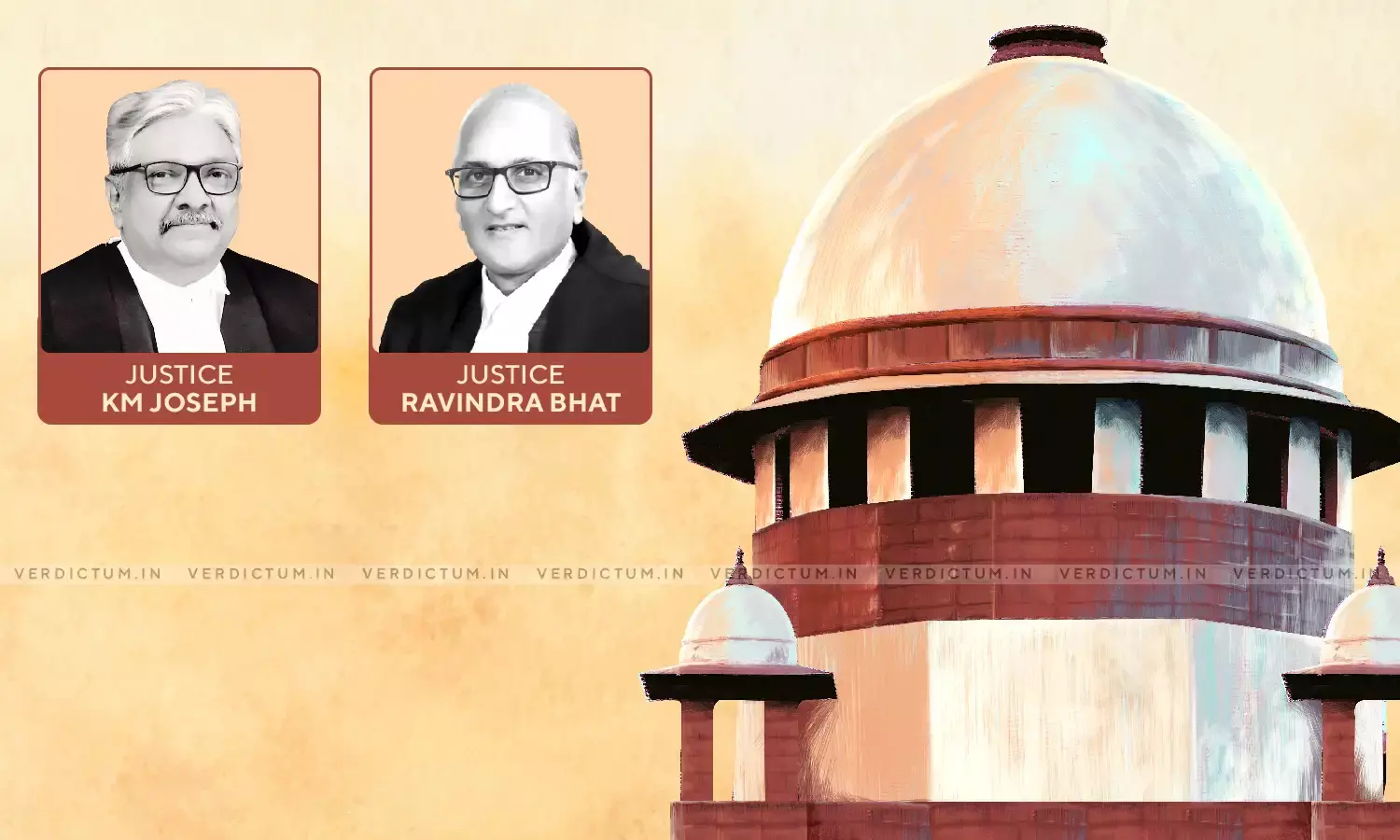Supreme Court Strikes Down Notification U/s. 17(4) Of Land Acquisition Act Since The File Did Not Reveal Urgency

A Supreme Court Bench consisting of Justice KM Joseph and Justice Ravindra Bhat has held last week that the existence of the exceptional circumstances justifying invoking of Section 17 (4) of the Land Acquisition Act, 1894 must be established in the wake of a challenge. The valuable rights of the given under Section 5(A) should not be unjustifiably extinguished by the authority.
"Section 5A of the Act guarantees a right to the person interested in the property which was the only statutory safeguard to stave off a compulsory acquisition of his property. The power under Section 17 (4) is discretionary. Being a discretion it must be exercised with due care. It is true that if there is relevant material however meagre it may be and the authority has without being guided by extraneous considerations applied his mind and taken a decision, then the court would adopt a hands-off approach," the Bench held.
In this case, the appellant challenged the land acquisition process undertaken by the Bulandshhar Khurja Development Authority in Uttar Pradesh by invoking Section 4 and 17(4) of the Act came to be invoked. The appellants unsuccessfully contested the case before the High Court.
Section 4 of the Act stipulates publication of preliminary notification and powers of officers thereupon, Section 5(A) of the Act mandates hearing of the objections of the property owners. while as per Section 17 (4) the authority can take over possession of the property even without passing through the procedure of the award of compensation.
The Court heard Advocate Abhay Yadav, on behalf of the appellant, Senior Counsel RK Raizada for the State of Uttar Pradesh while Advocate Ravindra Kumar for the Authority.
After hearing parties, the Bench considered the following two questions:-
(1) Whether there were relevant material before the Government to invoke power under section 17(4)?
(2) Lastly, whether the government applied its mind?
The Court perused the file related to the acquisition and found that the file does not reveal any urgency at all associated with the need to acquire the land immediately, which, according to the Bench, constitutes the foundation for invoking the urgency clause.
The Bench referred to a Three-Judge Bench Judgment in the case of Narayan Govind Gavate and Others v. State of Maharashtra and Others and reiterated that the Government must come out with evidence of exceptional circumstances for invoking Section 17(4).
"When a challenge is made to the invocation of power under Section 17 (4) the writ applicant cannot succeed on bare and bald assertions. The facts which are specifically within the exclusive knowledge of the state must be laid before the court on the basis of the principle in Section 106 of the Evidence Act. Existence of the exceptional circumstances justifying invoking of Section 17 (4) must be established in the wake of a challenged," the Bench stated.
It further stated, "The true concept unravelled by this Court in Gavate (supra) is the total evidence theory. In other words, on an appreciation of the evidence made available by all the parties it is open to the court to conclude that no occasion arose for resorting to the power under Section 17 (4) which indeed must be read as an exception to the general rule that the acquisition of property is made after affording an opportunity the person adversely affected to demonstrate that the acquisition was unjustified."
The Bench asserts that the authority must form a subjective opinion and it should not be whimsical and capricious and should have relevant material.
"We may cull out the principles at play. What is required of the authority is to form a subjective opinion. This does not mean that the opinion can be whimsical or capricious. There must be materials before the authority. The materials must be relevant. The authority must apply his mind to the material. This is apart from the requirement that action must not be malafide," the Bench commented.
It opines that the purpose must be a public purpose. But merely because the purpose of the acquisition is found to be a public purpose, the duty of the authority does not end. He must be satisfied that there is real agency such that the invaluable right vouchsafed to a person to ventilate his grievances against the acquisition is not unjustifiably extinguished.
"The authorities must remain alive and alert to the precious right created in favour of the citizens which is not meant to be a mere empty ritual," the Bench stated.
The Bench lastly noted the fact that the authority has invoked Section 17(4), there was delay in issuance of declaration under Section 6 of the Act.
"Even the notification under section 17(4) came to be issued after more than two years of the proposal sent sometime in March, 2006 if not earlier. We have already noted the fact that declaration under section 6 came to be 60 issued only on 9.4.2009, just two days prior to the first anniversary of the date of notification under section 4. More importantly, we have noticed what finally impelled the Government to issue the notification, namely, the apprehension that if it is not issued within one year of the section 4 notification the acquisition would lapse. This had nothing to do with urgency which would have manifested in the section 6 declaration being issued much earlier," the Bench noted.
"In the meantime, the Land Acquisition Act was repealed and the Right to Fair Compensation and Transparency in Land Acquisition, Rehabilitation and Resettlement Act, 2013 has taken its place. Therefore, there is no question of the matter being considered for an inquiry being held under section 5A," the Court concluded.
Thus the Bench allowed the appeal and set aside the judgment of the High Court.
Click Here to Read/Download the Judgment

